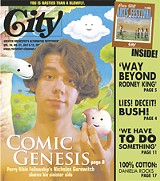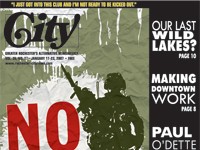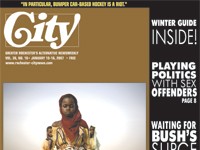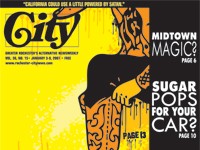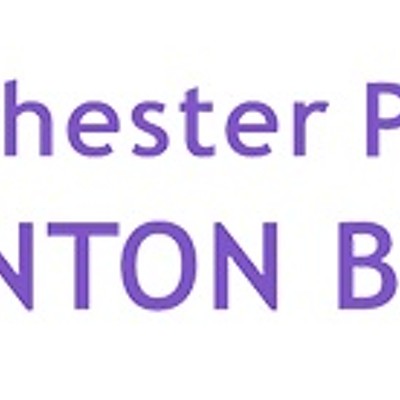[
{
"name": "500x250 Ad",
"insertPoint": "5",
"component": "15667920",
"parentWrapperClass": "",
"requiredCountToDisplay": "1"
}
]
Imagine this: Two emergency relief workers, a man and a woman, are busily assessing the damage from a disaster.
"Deborah, I've found no survivors," the man tells his colleague. He points to a nearby scene. "Especially not over there."
"No, Frank. Not now," the woman replies, frowning.
But it's too late. Looking over their shoulders, we can see on a hillside that Frank has carefully assembled the dead bodies to create a giant display spelling out the words: "Will you marry me?"
That jolt of humor, and the unexpected perversity behind it, is from a weekly comic strip called The Perry Bible Fellowship; the mind that spawned it all belongs to Nicholas Gurewitch.
It's sometimes hard to reconcile the comic with its creator, a sweet, soft-spoken 23-year-old Manchester resident who's been spending his early summer drawing, writing, and playing ping-pong. The Perry Bible Fellowship's appeal derives, in part, from the dissonance between its sugary images and black humor. The comic often couples cuddly animals and a bright rainbow palette --- School of Care Bears, if you will --- with Gurewitch's dark, sometimes vicious sense of humor.
In another strip from the archives, two darling gnomes are shown playfully stirring giant cauldrons of bubbles. In the final panel, we see what the gnomes are up to: They're using their bubbles as instruments of torture on an imprisoned Gulliver. The tiny creatures have tied him down and pried his eyes open. They're demanding to be told where he's hidden all his sugar.
By no means is all of his humor dark or mean-spirited; some of his work is sweet and benign, and shows a boyish exuberance. His strips rely heavily on visual images, and include as little text as possible.
"It's so easy to make a bad comic strip if you're really not on the ball and absolutely at grips with what you're trying to say," Gurewitch says.
"I think if you include more text, maybe it would distract from the images," he says. "I've never felt the need to be too wordy. I know a lot of people don't give a whole lot of time to comics when they read them. There was a time in my life where if a comic had more than five words, I wouldn't read it. I cater to that little boy inside me. It's nice to be with one, two, or three images and be able to tell what's going on."
When pressed, Gurewitch cites Gary Larson, creator of The Far Side, and Bill Watterson, creator of Calvin & Hobbes, as his favorite cartoonists. While his strip lacks the total wild-eyed lunacy that marks R. Crumb's work, it occasionally echoes a similar trippy perversity, although Gurewitch rejects the comparison.
"I do respect his nuttiness," he says, "and I do get a major kick out of introducing it where it wasn't before. You definitely notice that in reality: Life itself bears so many examples of it --- something which seems wholesome, yet it reveals an unsavory aspect of itself later on."
"I admire a lot of [comic-strip artists]," he says. "Anyone who makes a cartoon is pretty admirable. It takes a certain amount of spirit to want to make a picture that conveys something in more than one panel. I'm interested in the field."
The majority of Gurewitch's readersview The Perry Bible Fellowship online, at his website (www.thepbf.com). It's also regularly published in several papers around the country, including the New York Press, Portland Mercury, and Baltimore City Paper, among others, as well as the UK and Czech versions of Maxim. The Perry Bible Fellowship makes its debut as a regular City Newspaper feature this week (see page 16).
Becoming a popular cartoonist was not part of a grand career design, Gurewitch says. He began drawing comics as an undergraduate student for Syracuse University's Daily Orange newspaper; although he hadn't drawn comic strips before, he started creating original pieces because he felt dissatisfied with the paper's offerings. He thought that he could make a contribution.
"I didn't really anticipate any great success," he says. "I never set out to be a comic-strip author at any point. [The comic's success is] not really surprising, because I do believe in my work, and to see it recognized shouldn't be a total surprise, but what I am very surprised at is how people overseas respond to it. In Finland, Britain, Australia, Czechoslovakia: It's great to see that the humor isn't lost in translation."
In 2003, his strip won the grand prize in the Baltimore City Paper comics contest.
"Newspaper comics today are getting off too easy," said contest judge Brian Ralph, a cartoonist and illustrator (Cave~In, Climbing Out, Fireball). "They're no longer expected to be funny, or even slightly amusing.... [Perry Bible Fellowship is] hilarious. When was the last time a comic actually made you laugh out loud?"
"I think I try to avoid making a dumb comic," Gurewitch says. "I think people might be attracted to my work ethic, because I do try hard to offer something unique and enjoyable. Maybe people somehow are recognizing that effort; I don't know. I like a lot of my comics because they have a lot of things you can notice. I guess it's just fun to notice things, personally.
"I hate references to pop culture," he says. "I don't like anything that might take you off the task of identifying what's going on in the strip. Half my sketchbook is devoted to such things: Everything is funny. Everything you laugh at has a dose of funny. On countless occasions, someone will say, 'Nick, that's good, you should make a comic about that.' And they're right to think that it's worth pursuing, but it's rare that you have a method to make a comic about it. Situations are funny for specific things.
"It's so easy to get your details mixed up," he says. "The same thing goes for if you tell someone a funny story, and you find yourself saying, 'You had to be there.' A lot of times, you really do have to be there. It's that subtle beautiful thing that made it funny in the first place. Comics are good about that: You are there in the moment."
Choosing a favorite among his comics is difficult, he says.
"One that recently made me chuckle is 'Genius Sir,'" he says. An army of dominos is battling an army of dice, and the general on the dice team presents the battle strategy to one of his soldiers. He demands that the first soldier on the dominos team be shot; the rest fall over in quick succession.
Gurewitch also works in other media; his website shows several examples of his original artwork, including a drawing done in marker in 1987, when he was 8. Titled "Contemplation of the Self," it's a self-portrait ringed with a smiling sun, butterflies, a tree: They're images that are not dissimilar to those appearing now in his sunnier comic strips.
Gurewitch, who holds a BFA in film from Syracuse University, considers himself primarily a filmmaker.
"Cartoons are movies basically, with a really low frame rate," he says. "There are few things they don't have in common."
Several of his short films, which can be seen on his website, have led Comedy Central, the Cartoon Network, HBO, and MTV2 to his door. When asked to elaborate on the networks' interest in his work, Gurewitch responds with a gentle modesty not typically seen in filmmakers.
"HBO simply e-mailed to say hello, basically," he says.
Really? HBO e-mails people to say hello?
"HBO was just curious to know if I had any ambitions in the world of movies and/or television," he says.
In fact, he does; at the moment, he's devoting most of his time to working on scripts. He's currently in conversation with Comedy Central for an original pilot for a short program that would air on the network's website.
"I think about a feeling or an idea that I want the viewer to experience, and do my best to make it happen," he says. "If that feeling doesn't come across to me when I examine what I've made, I re-make it, add to it, or edit it until it does."
His goal is to create bigger, better movies, he says. "Movies that really say something concrete. I love it when movies do something new, or are an event because of what they say (not who is in them, or what movie they are a sequel to)."
Gurewitch says that MTV2 plans to air two of his pieces this week. One of the features is a short called Ken's New Specs, which the filmmaker describes as "a tragic little animation about an ear of corn who shows off his new glasses on a sunshiney day." (You can see Ken's New Specs on Gurewitch's website.)
"I love, I absolutely adore, Stanley Kubrick," Gurewitch says, "and I have to think he's had some influence on my presentation ability. I really love his work. Da Vinci, for some reason, is very inspiring. And Beethoven: I like his gusto.
"I find Kubrick's way of communicating pretty thrilling," he says. "He seems to take out anything extraneous. He almost cuts to the absolute minimum; he introduces things in his movies almost as if they're ingredients. The way he forces you to look at them eradicates all distractions. He imposes some really grand communications on you, if you're willing to listen."
The Perry Bible Fellowship can be found every week in City Newspaper and at www.thepbf.com (with archives). Gurewitch's short film, The Liars, is scheduled to be shown on Monday, July 25, Little Theatre, at 9:15 p.m. Ken's New Specs and an excerpt from The Golden Turtle will be shown between videos this week on MTV2.
Latest in Featured story
More by Susan Herman
-
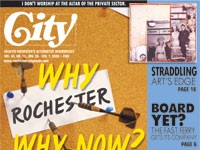
Why Rochester? Why now?
Jan 26, 2005 - More »
